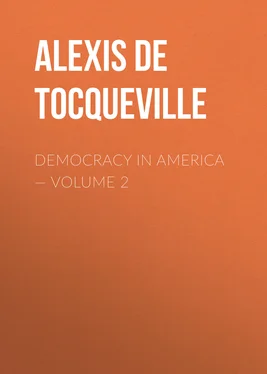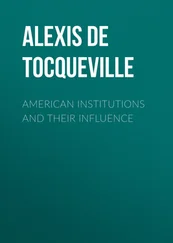Alexis de Tocqueville - Democracy in America — Volume 2
Здесь есть возможность читать онлайн «Alexis de Tocqueville - Democracy in America — Volume 2» — ознакомительный отрывок электронной книги совершенно бесплатно, а после прочтения отрывка купить полную версию. В некоторых случаях можно слушать аудио, скачать через торрент в формате fb2 и присутствует краткое содержание. Жанр: foreign_antique, Политика, foreign_edu, на английском языке. Описание произведения, (предисловие) а так же отзывы посетителей доступны на портале библиотеки ЛибКат.
- Название:Democracy in America — Volume 2
- Автор:
- Жанр:
- Год:неизвестен
- ISBN:нет данных
- Рейтинг книги:4 / 5. Голосов: 1
-
Избранное:Добавить в избранное
- Отзывы:
-
Ваша оценка:
- 80
- 1
- 2
- 3
- 4
- 5
Democracy in America — Volume 2: краткое содержание, описание и аннотация
Предлагаем к чтению аннотацию, описание, краткое содержание или предисловие (зависит от того, что написал сам автор книги «Democracy in America — Volume 2»). Если вы не нашли необходимую информацию о книге — напишите в комментариях, мы постараемся отыскать её.
Democracy in America — Volume 2 — читать онлайн ознакомительный отрывок
Ниже представлен текст книги, разбитый по страницам. Система сохранения места последней прочитанной страницы, позволяет с удобством читать онлайн бесплатно книгу «Democracy in America — Volume 2», без необходимости каждый раз заново искать на чём Вы остановились. Поставьте закладку, и сможете в любой момент перейти на страницу, на которой закончили чтение.
Интервал:
Закладка:
If I now consider man in his isolated capacity, I find that dogmatical belief is not less indispensable to him in order to live alone, than it is to enable him to co-operate with his fellow-creatures. If man were forced to demonstrate to himself all the truths of which he makes daily use, his task would never end. He would exhaust his strength in preparatory exercises, without advancing beyond them. As, from the shortness of his life, he has not the time, nor, from the limits of his intelligence, the capacity, to accomplish this, he is reduced to take upon trust a number of facts and opinions which he has not had either the time or the power to verify himself, but which men of greater ability have sought out, or which the world adopts. On this groundwork he raises for himself the structure of his own thoughts; nor is he led to proceed in this manner by choice so much as he is constrained by the inflexible law of his condition. There is no philosopher of such great parts in the world, but that he believes a million of things on the faith of other people, and supposes a great many more truths than he demonstrates. This is not only necessary but desirable. A man who should undertake to inquire into everything for himself, could devote to each thing but little time and attention. His task would keep his mind in perpetual unrest, which would prevent him from penetrating to the depth of any truth, or of grappling his mind indissolubly to any conviction. His intellect would be at once independent and powerless. He must therefore make his choice from amongst the various objects of human belief, and he must adopt many opinions without discussion, in order to search the better into that smaller number which he sets apart for investigation. It is true that whoever receives an opinion on the word of another, does so far enslave his mind; but it is a salutary servitude which allows him to make a good use of freedom.
A principle of authority must then always occur, under all circumstances, in some part or other of the moral and intellectual world. Its place is variable, but a place it necessarily has. The independence of individual minds may be greater, or it may be less: unbounded it cannot be. Thus the question is, not to know whether any intellectual authority exists in the ages of democracy, but simply where it resides and by what standard it is to be measured.
I have shown in the preceding chapter how the equality of conditions leads men to entertain a sort of instinctive incredulity of the supernatural, and a very lofty and often exaggerated opinion of the human understanding. The men who live at a period of social equality are not therefore easily led to place that intellectual authority to which they bow either beyond or above humanity. They commonly seek for the sources of truth in themselves, or in those who are like themselves. This would be enough to prove that at such periods no new religion could be established, and that all schemes for such a purpose would be not only impious but absurd and irrational. It may be foreseen that a democratic people will not easily give credence to divine missions; that they will turn modern prophets to a ready jest; and they that will seek to discover the chief arbiter of their belief within, and not beyond, the limits of their kind.
When the ranks of society are unequal, and men unlike each other in condition, there are some individuals invested with all the power of superior intelligence, learning, and enlightenment, whilst the multitude is sunk in ignorance and prejudice. Men living at these aristocratic periods are therefore naturally induced to shape their opinions by the superior standard of a person or a class of persons, whilst they are averse to recognize the infallibility of the mass of the people.
The contrary takes place in ages of equality. The nearer the citizens are drawn to the common level of an equal and similar condition, the less prone does each man become to place implicit faith in a certain man or a certain class of men. But his readiness to believe the multitude increases, and opinion is more than ever mistress of the world. Not only is common opinion the only guide which private judgment retains amongst a democratic people, but amongst such a people it possesses a power infinitely beyond what it has elsewhere. At periods of equality men have no faith in one another, by reason of their common resemblance; but this very resemblance gives them almost unbounded confidence in the judgment of the public; for it would not seem probable, as they are all endowed with equal means of judging, but that the greater truth should go with the greater number.
When the inhabitant of a democratic country compares himself individually with all those about him, he feels with pride that he is the equal of any one of them; but when he comes to survey the totality of his fellows, and to place himself in contrast to so huge a body, he is instantly overwhelmed by the sense of his own insignificance and weakness. The same equality which renders him independent of each of his fellow-citizens taken severally, exposes him alone and unprotected to the influence of the greater number. The public has therefore among a democratic people a singular power, of which aristocratic nations could never so much as conceive an idea; for it does not persuade to certain opinions, but it enforces them, and infuses them into the faculties by a sort of enormous pressure of the minds of all upon the reason of each.
In the United States the majority undertakes to supply a multitude of ready-made opinions for the use of individuals, who are thus relieved from the necessity of forming opinions of their own. Everybody there adopts great numbers of theories, on philosophy, morals, and politics, without inquiry, upon public trust; and if we look to it very narrowly, it will be perceived that religion herself holds her sway there, much less as a doctrine of revelation than as a commonly received opinion. The fact that the political laws of the Americans are such that the majority rules the community with sovereign sway, materially increases the power which that majority naturally exercises over the mind. For nothing is more customary in man than to recognize superior wisdom in the person of his oppressor. This political omnipotence of the majority in the United States doubtless augments the influence which public opinion would obtain without it over the mind of each member of the community; but the foundations of that influence do not rest upon it. They must be sought for in the principle of equality itself, not in the more or less popular institutions which men living under that condition may give themselves. The intellectual dominion of the greater number would probably be less absolute amongst a democratic people governed by a king than in the sphere of a pure democracy, but it will always be extremely absolute; and by whatever political laws men are governed in the ages of equality, it may be foreseen that faith in public opinion will become a species of religion there, and the majority its ministering prophet.
Thus intellectual authority will be different, but it will not be diminished; and far from thinking that it will disappear, I augur that it may readily acquire too much preponderance, and confine the action of private judgment within narrower limits than are suited either to the greatness or the happiness of the human race. In the principle of equality I very clearly discern two tendencies; the one leading the mind of every man to untried thoughts, the other inclined to prohibit him from thinking at all. And I perceive how, under the dominion of certain laws, democracy would extinguish that liberty of the mind to which a democratic social condition is favorable; so that, after having broken all the bondage once imposed on it by ranks or by men, the human mind would be closely fettered to the general will of the greatest number.
Читать дальшеИнтервал:
Закладка:
Похожие книги на «Democracy in America — Volume 2»
Представляем Вашему вниманию похожие книги на «Democracy in America — Volume 2» списком для выбора. Мы отобрали схожую по названию и смыслу литературу в надежде предоставить читателям больше вариантов отыскать новые, интересные, ещё непрочитанные произведения.
Обсуждение, отзывы о книге «Democracy in America — Volume 2» и просто собственные мнения читателей. Оставьте ваши комментарии, напишите, что Вы думаете о произведении, его смысле или главных героях. Укажите что конкретно понравилось, а что нет, и почему Вы так считаете.












